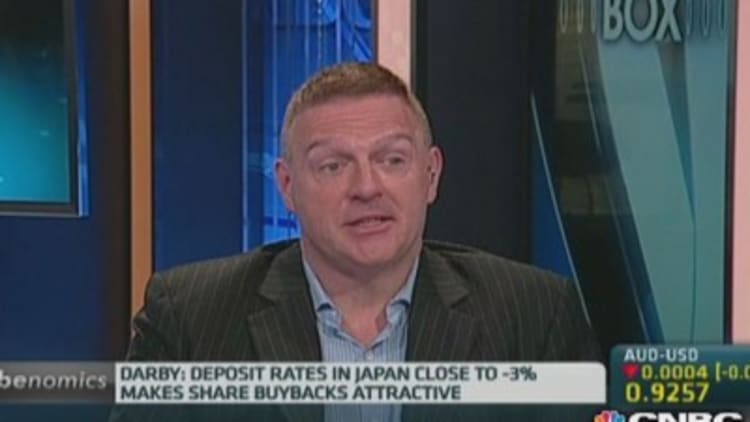
The Nikkei touched a fresh two-month high this week, a sign that concerns about Japan's economy are fading, analysts say.
"We remain bullish [on Japan stocks] - we went through a difficult patch in the first quarter and took some pain on that trade, but I think it's still the most logical place in the region," said Sean Darby, chief global equity strategist at Jefferies. "Real rates are negative, there is ongoing stimulus and the corporate sector is starting to re-engineer its balance sheet."
Stocks powered higher on Thursday, to reach 15,141 soon after open, it's highest level since April 3.
Last year, Abenomics - Prime Minister Shinzo Abe's plan to boost Japan's economy through aggressive easing, fiscal stimulus and structural reform - saw the Nikkei rise 55 percent, while the yen depreciated 21 percent against the U.S. dollar boosting exporter stocks.
Read MoreIs this the Nikkei's last hurrah before the fall?
However, the Nikkei fell 8.2 percent during the first quarter of 2014 amid concerns about the impact of a consumption tax hike to 8 percent from 5 percent in April and as investors began to lose faith in Abe's ability to push through structural reforms.
Companies were afraid that Japan's economy would lurch back into the dangerous deflationary spiral that the last tax hike prompted in the 1990s, said Sean Darby, chief global equity strategist at Jefferies.
But the economy has proved resilient, and Japan's core consumer prices jumped 3.2 per cent in April from a year earlier, the fastest gain since February 1991.
Read MoreJapan's sales-tax hike turns shoppers away
"All the forward looking indicators are showing that the corporate sector has actually been able to withstand that shock and indeed in the first quarter private investment by Japanese companies came close to 6 percent on an annualized basis," Darby added.
Other economists agree that sentiment had turned too bearish at the start of 2014.
"It is getting harder and harder for the Abenomics nay-sayers to justify their position that Abenomics is not working," Ed Rogers, CEO & CIO at Rogers Investment Advisors, told CNBC.
"Concerns about a potential collapse in the Japanese economy (or failure of Abenomics' third arrow) based on the previous experience of implementation of the sales tax in 1997, proved unfounded. We've seen excellent year-on-year progress on CPI (inflation), housing starts, capital spending and job-to-applicant ratio," he added.
Read MoreDeflation in Japan may finally be 'dead'
Meanwhile, investors have also turned more positive on progress on structural reforms.
This week Abe and the tax panel of his ruling Liberal Democrat Party agreed to cut Japan's corporate tax rate from fiscal 2015 - one of the structural reforms investors were worried might not come to fruition. Japan's corporate tax rate currently sits at around 35.6 percent - among the highest in industrialized nations.
The release this week of a draft of the government's growth strategy -officially due later this month- has also powered stocks higher.


